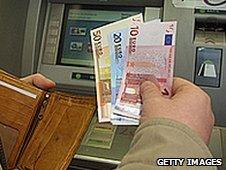EU in new deal with US on bank data access
- Published

The Swift payments system handles a vast amount of personal data
The European Commission has approved a deal to allow US anti-terror investigators continued access to European bank transaction data.
Data transfers have been suspended since February, when Euro MPs rejected an earlier draft agreement, saying the privacy safeguards were inadequate.
The European Parliament still has to vote on the revised deal.
Commission president Jose Manuel Barroso told MEPs that the new draft "has strict safeguards on privacy".
US access to bank data in the Swift money transfer system would be "strictly limited" to the prevention and detection of terrorist financing, he said.
Swift handles millions of transactions daily between banks and other financial institutions worldwide. It holds the data of some 8,000 banks and operates in 200 countries.
Transatlantic partnership
Top US officials, including Secretary of State Hillary Clinton, have lobbied the EU over the data transfer deal.
Mr Barroso stressed the importance of the US Terrorist Financing Tracking Programme (TFTP) in EU-US relations.
"Our American partners considered this the first priority in relations with the EU. A significant volume of data was not available to the Americans," he told MEPs in Strasbourg.
But the leader of the European Socialist group, German MEP Martin Schulz, told Mr Barroso that "there are serious misgivings about these negotiations in this house".
"What the Commission decided today is not what the parliament would view as constituting progress," he said.
The US started accessing Swift data after the 11 September 2001 terror attacks on New York and Washington.
But the fact that the US was secretly accessing such data did not come to light until 2006.
Privacy checks
The EU Commissioner for Home Affairs, Cecilia Malmstroem, said the revised agreement would ensure Europol scrutiny of US data requests.
"Europol will assess whether those data are necessary for the fight against terrorism and its financing before the data is sent to the US," she said last week.
Safeguards in the deal would also ensure that the US requests were "tailored as narrowly as possible" to minimise the amount of data transferred, she said.
The draft also provides for "an independent EU person" appointed by the Commission to monitor the US investigators' actions, she said.
There is also a requirement that "bulk data can never be sent to third countries".
The Commission says the data transferred under TFTP can include identifying information about the originator and/or recipient of the transaction, including name, address, national identification number and other personal data related to financial messages.
"The essence of the TFTP is that each month a large volume of data is transferred," the Commission says.
But the data on the TFTP database "are effectively anonymous unless there is a reason to believe that a person is engaged in terrorism".